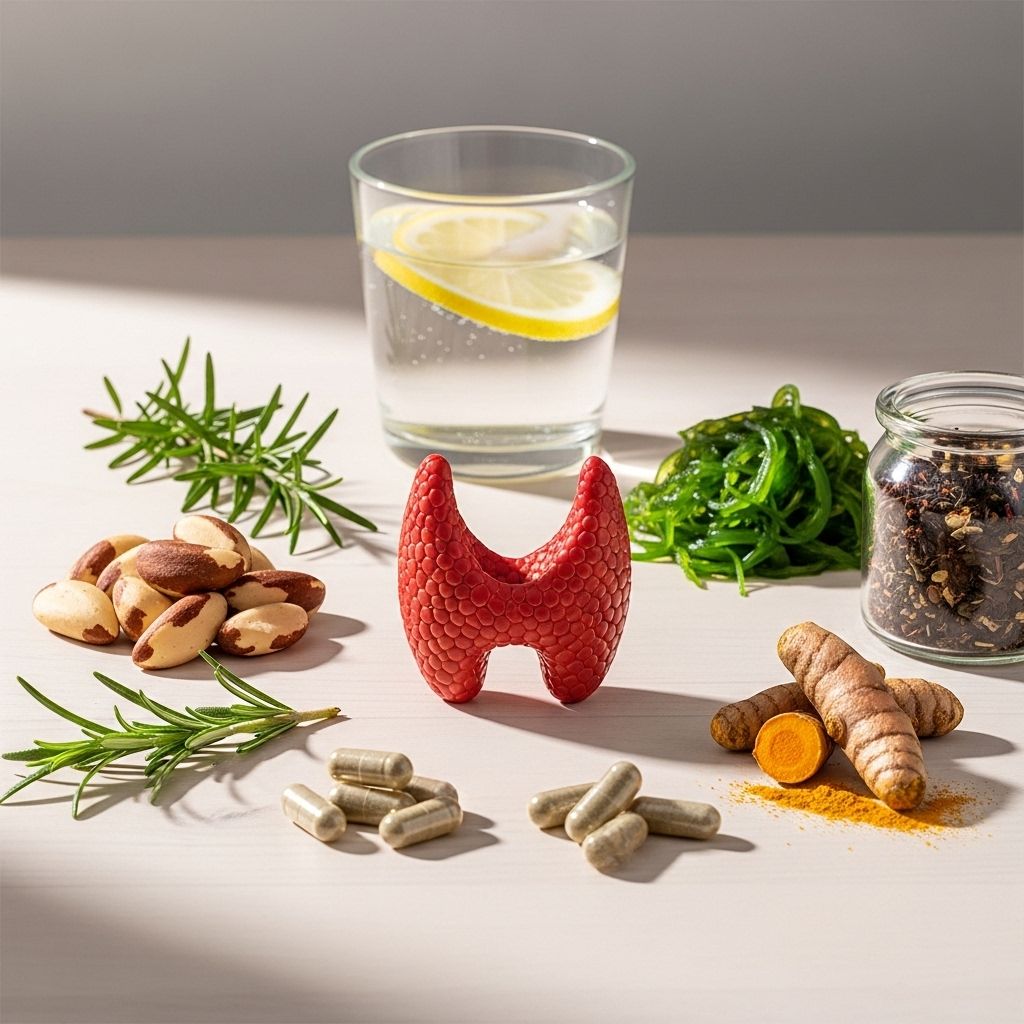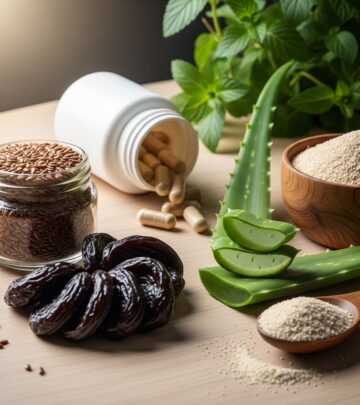7 Natural Remedies to Boost Thyroid Health
Discover evidence-based natural strategies, foods, and herbs to support thyroid health and balance.

The thyroid gland regulates metabolism, energy, and many vital processes in the body. When its function is impaired, it can affect every aspect of your wellbeing. While medical management—particularly with hormone replacement therapy—remains standard for conditions like hypothyroidism, growing evidence shows that targeted natural remedies and lifestyle changes can significantly support thyroid health and improve symptoms. This article explores seven effective natural approaches, including nutrients, herbs, dietary strategies, and lifestyle habits that may benefit your thyroid.
Understanding Your Thyroid
Your thyroid is a butterfly-shaped gland located at the front of your neck, responsible for producing hormones such as thyroxine (T4) and triiodothyronine (T3). These hormones affect metabolism, growth, mood, and more. Common thyroid issues include hypothyroidism (underactive thyroid) and hyperthyroidism (overactive thyroid), which have distinct causes and symptoms. For most people seeking natural thyroid support, the goal is to enhance underactive thyroid function or optimise its balance through diet and lifestyle.
1. Ensure Adequate Iodine Intake
Iodine is an essential mineral required by the thyroid to produce hormones. Without enough iodine, the gland cannot function properly, resulting in hypothyroidism and symptoms like fatigue, weight gain, and sensitivity to cold. However, excessive iodine can be harmful, especially for those with autoimmune thyroid issues, so balance is crucial.
- Sources of Iodine: Seaweed, fish, iodized salt, eggs, dairy, beef liver, and chicken.
- Caution: Excessive supplementation can worsen hypothyroidism—consult your practitioner before starting iodine supplements.
If you suspect you may be iodine deficient, have your lab levels checked before increasing intake.
2. Support with Selenium
Selenium is another essential trace mineral important for thyroid hormone metabolism, protection against oxidative stress, and immune health. Research suggests it may help balance thyroid hormone levels, especially in cases of autoimmune thyroid conditions like Hashimoto’s thyroiditis.
Selenium also supports the conversion of inactive T4 hormone to its active T3 form, promoting better hormone balance in the body.
- Rich food sources: Brazil nuts, grass-fed beef, tuna, turkey, seafood, eggs.
- Supplemental strengths: Supplement only on medical advice to avoid selenium toxicity.
Various scientific studies indicate improvement in thyroid function markers (TSH, T3, T4) in people supplementing selenium, especially those with Hashimoto’s.
3. Boost Thyroid Function with Zinc
Zinc is required for the synthesis of thyroid hormones and plays a role in hormone receptor function. Zinc deficiency is linked to hypothyroidism, and supplementation can help improve both thyroid hormone levels and immune response.
- Best sources: Oysters, beef, poultry, pumpkin seeds, beans, cashews, and whole grains.
- Moderate supplemental zinc may improve hypothyroidism symptoms—but always consult a healthcare professional.
Correcting zinc deficiency may support T3 levels and overall wellbeing.
4. Adopt a Nutrient-Dense, Anti-Inflammatory Diet
A diet rich in whole foods, antioxidants, and healthy fats can support thyroid health. Some dietary changes may help address common root causes of thyroid dysfunction, including nutrient deficiencies, inflammation, and autoimmune reactions.
- Eat plenty of: Fresh vegetables, fruits, quality proteins, nuts, seeds, and healthy oils.
- Limit: Processed foods, added sugars, refined grains, and inflammatory fats.
- Consider: A sugar-free and/or gluten-free diet, particularly if you have Hashimoto’s thyroiditis or gastrointestinal issues.
Gluten-free diets are particularly beneficial for individuals with confirmed gluten intolerance, coeliac disease, or autoimmune thyroid conditions.
5. Support with Key Vitamins: B Vitamins and Vitamin D
B vitamins, especially B12 and B3, play a significant role in energy metabolism, thyroid hormone synthesis, and maintaining a healthy nervous system. Deficiency in B12 is common in thyroid disorders and may worsen fatigue and cognitive issues.
- Sources of B vitamins: Peas, beans, nuts, dairy, eggs, tuna, asparagus, seeds.
- B12 supplementation may help repair thyroid damage and improve symptoms in people with deficiencies.
Vitamin D deficiency is also prevalent in thyroid disorders and immune dysfunction. Sun exposure and targeted supplementation may support overall thyroid and immune health.
6. Utilize Herbal Remedies for Thyroid Health
Many herbs are traditionally used and increasingly scientifically validated for their benefit on thyroid function. These include adaptogens (which help the body adapt to stress), antioxidants, and endocrine-supportive plants:
- Ashwagandha (Withania somnifera): Shown to boost thyroid hormone levels, reduce stress and improve energy. Likely beneficial for subclinical hypothyroidism.
- Nigella sativa (Black seed): May reduce oxidative stress and improve thyroid markers according to animal and limited human studies.
- Ginger: Possesses antioxidant activity and may improve thyroid function.
- Moringa oleifera: May help reduce oxidative damage to thyroid tissue.
- Bacopa monnieri (Brahmi): Traditionally used as neuro-supportive herb and may aid thyroid hormone regulation.
- Chinese herbal formulas: Some show promise—especially when combined with conventional therapies—for supporting TSH, T3, and T4 levels.
Herbal treatments should be approached with caution and professional guidance, as not all are safe or effective for every individual. Herbs like Bladderwrack and excessive kelp, for example, can be harmful due to high iodine content.
7. Probiotics and Gut Health for Thyroid Support
The connection between the gut and thyroid health is increasingly recognized. Gut imbalances and poor digestive health can aggravate autoimmune thyroid conditions and compromise nutrient absorption. Supplementing with probiotics supports a healthy gut flora, which in turn may reduce systemic inflammation and improve thyroid hormone conversion.
- Best sources of probiotics: Fermented foods (yogurt, kefir, sauerkraut, kimchi) and high-quality probiotic supplements.
- Address gut health as part of broader thyroid management strategies.
Precautions and Nutrients to Avoid or Use With Caution
While diet and natural remedies can support thyroid function, some nutrients and supplements should be used carefully:
- Excess iodine: May worsen hypothyroidism and autoimmune thyroid disease.
- Soy: Can interfere with thyroid hormone absorption; avoid large quantities if hypothyroid or on medication.
- Iron/Ca supplements: May affect thyroid medication absorption; separate dosing by at least 4 hours.
- Herbs to avoid: Certain products such as nettle, kelp, sea moss, and others should be avoided unless under expert care.
Lifestyle Factors for Thyroid Wellness
- Manage stress: Chronic stress raises cortisol, which can impair thyroid function. Practice relaxation techniques such as yoga, meditation, and controlled breathing.
- Regular movement: Engage in moderate exercise to boost metabolism, mood, and hormone balance.
- Avoid toxins: Limit exposure to pesticides, plastics, and chemical-heavy personal care products, which may disrupt endocrine health.
Creating a balanced lifestyle and environment supports the thyroid beyond just nutrition and supplementation.
Frequently Asked Questions (FAQs)
Q: Can I treat hypothyroidism solely with natural remedies?
A: Most patients require prescribed thyroid hormone replacement. Natural remedies may support health, symptom relief, and wellbeing, but should not replace medical treatment without a doctor’s supervision.
Q: Are supplements like iodine and selenium safe for everyone?
A: No. Excessive iodine and selenium can cause harm and worsen thyroid function. Always test for deficiencies and supplement only under the guidance of a healthcare provider.
Q: Which foods should I avoid if I have thyroid problems?
A: Limit highly processed foods, refined sugars, and soy-based products. Also, avoid excessive raw cruciferous vegetables if you are hypothyroid, and separate iron or calcium supplements from your thyroid medication by several hours.
Q: Do gluten-free diets improve thyroid health?
A: For those with autoimmune thyroid disease or gluten intolerance/coeliac disease, a gluten-free diet may reduce symptoms and improve wellbeing. Others may not benefit from gluten avoidance.
Q: Can herbs cure thyroid disease?
A: Herbs can support thyroid balance but are rarely curative by themselves. More research is needed to confirm the benefits. Use medicinal herbs only under professional advice.
Summary Table: Core Nutrients & Actions for Thyroid Health
| Remedy | Best Food Sources | Main Benefits | Key Precautions |
|---|---|---|---|
| Iodine | Seaweed, iodized salt, fish | Thyroid hormone synthesis | Excess intake may worsen thyroid disease |
| Selenium | Brazil nuts, seafood, eggs | Hormone conversion, antioxidant | Supplement only if deficient |
| Zinc | Oysters, beef, pumpkin seeds | Hormone synthesis, immune balance | Toxic at high doses |
| B Vitamins | Beans, eggs, dairy, tuna | Energy, nerve function | Often needed as supplements |
| Herbs | Ashwagandha, Nigella sativa, ginger | Protection, adaptogenic support | Professional guidance needed |
| Probiotics | Yogurt, kefir, sauerkraut | Gut health, reduced inflammation | Select strains for best results |
Conclusion
Optimal thyroid health requires a multifaceted approach that includes medical care, balanced nutrition, targeted supplementation, herbal support, and lifestyle management. While natural remedies can help support thyroid function and reduce symptoms, always consult with your healthcare provider before making any major changes. Use this information as part of a comprehensive plan to boost your thyroid naturally and nurture overall wellbeing.
References
- https://www.btf-thyroid.org/diets-and-supplements-for-thyroid-disorders
- https://www.healthline.com/health/hypothyroidism/five-natural-remedies-for-hypothyroidism
- https://pmc.ncbi.nlm.nih.gov/articles/PMC11607114/
- https://www.mayoclinic.org/diseases-conditions/hypothyroidism/expert-answers/hypothyroidism-diet/faq-20058554
- https://supremevascular.com/conditions-and-treaments/thyroid-nodules/how-to-treat-thyroid-problems-naturally-at-home/
- https://www.medicalnewstoday.com/articles/herbs-that-imporove-thyroid-health
- https://www.ebsco.com/research-starters/complementary-and-alternative-medicine/natural-treatments-hypothyroidism
- https://www.youtube.com/watch?v=MBxKRsRUU24
- https://www.thyroid.org/thyroid-disease-cam/
Read full bio of Sneha Tete












